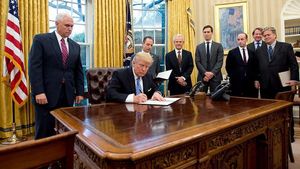The German Bundestag has recently made significant decisions affecting its military operations and domestic citizenship laws, reflecting the deep political currents stirring within the nation.
On February 2, 2025, just three-and-a-half weeks before the upcoming elections, Bundestag members voted overwhelmingly to extend military deployments for German forces. These deployments span several international operations, including the protection of commercial shipping lanes against threats from the Houthi militia along the Red Sea, monitoring activities off the coast of Libya, and participating in the United Nations’ peacekeeping mission in South Sudan, known as UNMISS.
According to dpa, the votes on these extensions were critically important to the German government, which had pushed the extensions forward to maintain military stability amid the electoral timeline. These operations form part of broader EU and NATO missions aimed at ensuring regional stability and combatting terrorism.
Meanwhile, on the national front, the debate on migration policy has escalated dramatically, thrusting the far-right Alternative for Germany (AfD) party back to the center of political discourse. Following a tragic stabbing incident last week in the town of Aschaffenburg, the CDU leader, who is also aiming to position himself as the frontrunner for chancellor, presented motions aimed at tightening migration rules along Germany's borders.
This maneuver did not go unnoticed. The CDU/CSU’s reliance on support from the AfD, previously considered taboo, to secure the passing of certain resolutions has raised eyebrows across the political spectrum. Political commentator Kai Arzheimer remarked on the seriousness of this breach, stating, “Merz's gamble helps legitimize the AfD and paves the way for more cooperation,” which many see as damaging to the traditional stance of mainstream parties against the far right.
Despite the turbulence, attempts to tighten migration laws via the Bundestag saw mixed outcomes. A significant motion aimed at allowing the German government to strip dual citizens of their citizenship for serious criminal offenses failed to garner majority support during recent sessions. This motion highlighted the CDU/CSU's long-standing ambition to unravel citizenship reforms enacted by the previous government, particularly concerning dual citizenship, which had made naturalization far more accessible.
Under the light of these developments, it appears the CDU/CSU may struggle to find coalition partners willing to back their agenda. Aaron Burnett noted, “This failed motion tells us... unlikely to be able to find any governing coalition partner willing to repeal citizenship reform.” The ramifications of these motions come against the backdrop of rising public interest and support for dual citizenship, particularly from various immigrant communities, including British citizens seeking German status after Brexit.
Historically, dual citizenship has been contentious within German politics, with debates often reflecting broader social attitudes toward immigration and national identity. Proponents argue for inclusivity and recognition of multiple heritages, whereas critics cite concerns over allegiance and national security as justifications for strict citizenship laws.
This tug of war between maintaining security and ensuring inclusivity is emblematic of the challenges faced by the modern German polity. Recent elections as well as the rising influence of both right-wing populism and progressive policies concerning migration and citizenship reform will be instructive as they reflect the nation's approach to creating its future.
With elections approaching and high stakes surrounding these two issues, how Germany proceeds with its military missions abroad relative to its domestic policies will likely shape both its international reputation and internal social cohesion. The next few weeks will certainly prove pivotal as all eyes turn to the voters and their responses to these broad legislative initiatives.



